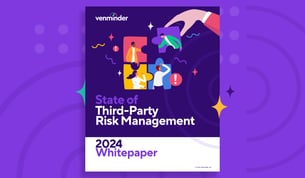video
Third-Party Due Diligence
What third-party due diligence entails.
In this video, you'll learn four key things you need to know regarding third-party due diligence and what your due diligence checklist should contain.
Sample: Receive a FREE Vendor Vetting Package
Guide: Vendor Due Diligence
Video Transcript
Welcome to this week’s Third Party Thursday! My name is Kay Perry and I’m the Senior Operations Manager here at Venminder. Today we’re going to talk about Third-Party Due Diligence – what you need to know and what your due diligence checklist should contain.
Due diligence is a science and an art – by that, I mean there are times when not everything will be available and you have to get creative. But let’s think about the basic aspects of due diligence:
1. Risk-based & Reasonable: For example, if one of your service providers is the guy who mows the lawn, you obviously aren’t going to ask him for his SSAE 18 report. Well, you could but the response likely would not be appropriate for repeating.
2. Request list & the nature of the items should match the service provided: one element of due diligence may lead you to ask for another.
For example, if you’re looking for a call center’s compliance policies and they refer to training materials, you’re likely going to need those as well.
3. The due diligence should be done pre-contract: at least as much as possible. That means well before the contract, not in a frantic effort to get things done to hit a supposed contract date.
There will be times that you cannot complete due diligence prior to the contract. Some items you may even have to contractually oblige them to provide, but make sure you document it and commit them to provide as soon as reasonably possible.
A few examples are things like evidence of audits, financials, and customer records – it’s understandable that they want to hold onto them but at the same time, if you need them, make sure the contract provides you the avenue to obtain them.
4. Must be timely, thorough and ongoing:
-
- Due diligence must be timely: This is a common pitfall that we turned into a best practice. One of the things that is easy to get stale dated is the financial reports – if you simply lock due diligence on a particular month on the calendar, you could be looking at financials that are a year old.
So in my experience, we changed and set it up so that we initiated the due diligence cycle 90 days after their fiscal year end. That way we would always have the most updated information.
There may be times that it’s hard from a workload standpoint – especially if there are hundreds or even thousands of third parties to review - but we tried to get financials as the most timely item…. And it paid off several times. - Due diligence must be thorough: It’s easy to cut corners but that can lead to ugly surprises, particularly if you follow a checklist mentality and just obtain the documents without adequately reviewing them.
- Due diligence must be ongoing: This became an actual requirement in 2013 when the OCC issued its updated guidance, but it has always been a sound business practice. This doesn’t mean everything has to constantly be updated, but it should be tracked so major documents and major milestones are not missed.
- Due diligence must be timely: This is a common pitfall that we turned into a best practice. One of the things that is easy to get stale dated is the financial reports – if you simply lock due diligence on a particular month on the calendar, you could be looking at financials that are a year old.
If you need more information, we certainly can offer a vendor vetting package that includes some of the essential elements that you should consider with every third party, from articles of incorporation, to a reputation risk check, to a secretary of state check, and several other fundamental items.
So to recap…
- Your due diligence should be risk based and reasonable
- The request list and the nature of the items should match the service provided
- Due diligence should be done pre-contract
- And should be timely, thorough, and ongoing
Again, I’m Kay and thank you for watching! If you haven’t already, subscribe to the Third Party Thursday series.
Subscribe to our Third Party Thursday Newsletter
Receive weekly third-party risk management news, resources, and more to your inbox.
Ready to Get Started?
Schedule a personalized solution demonstration to see how Venminder can transform your vendor risk management processes.















